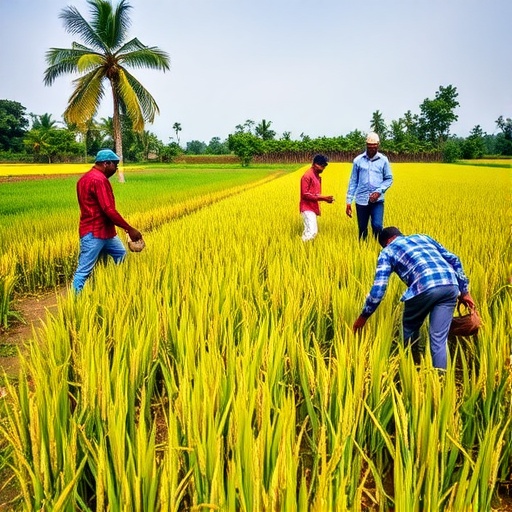In an era marked by rapid climate change and its far-reaching impacts, agricultural communities are particularly vulnerable. This vulnerability extends beyond mere economic implications; it encompasses social, environmental, and even psychological dimensions. A recent study published in Discover Sustainability has embarked on a journey to quantitatively assess the livelihood vulnerabilities faced by rice farmers in West Bengal, India, a region that encapsulates the growing tensions between agricultural practices and climatic shifts. The implications of this research are profound, as they bring to the light the intricate web of factors that interplay in shaping agricultural resilience.
Rice is not just a staple food for a majority of the global population; it is also a cultural cornerstone in many Asian countries, including India. The intricate farming practices, traditional knowledge, and agricultural biodiversity that once thrived are increasingly threatened by unpredictable weather patterns and climate-related disasters. This recent study conducted by Maity, Sahoo, and Govind introduces a novel, field-based, data-driven modeling approach designed to evaluate how climate risks are altering the livelihood landscapes of rice farmers in West Bengal.
Through a meticulous blend of data collection and modern modeling techniques, the researchers were able to capture the multifaceted aspects of climate risk. They gathered comprehensive datasets, including historical climate data, socio-economic indicators, and agricultural yield statistics. By employing statistical models, the team could establish correlations between changing climate variables and the economic well-being of rice farmers. This approach not only enhances the understanding of vulnerabilities but also aids in predicting future scenarios that can prepare farmers for potential climate-induced challenges.
One of the study’s critical findings is the clear identification of risk factors impacting farmers’ livelihoods. For instance, the incidence of erratic rainfall patterns, prolonged droughts, and increasing temperatures were found to correlate strongly with decreasing crop yields. These environmental changes do not occur in a vacuum; they compound existing grievances such as poor market access, inadequate infrastructural support, and financial insecurity. Consequently, the farmers find themselves ensnared in a cycle of vulnerability that can have devastating consequences on both a personal and community level.
In a significant move, the researchers have also provided practical recommendations based on their findings. They advocate for the integration of climate-smart agricultural practices that prioritize sustainability and resilience. By promoting crop diversification, community-based water management systems, and improved access to climate-resilient seed varieties, farmers can bolster their defenses against impending climate challenges. Furthermore, they propose enhancing financial literacy and providing insurance mechanisms tailored to the unique risks faced by farmers in this region, thereby empowering them to make informed decisions.
However, the study does not merely stop at local implications; it ties the challenges faced by these farmers to a larger narrative about global food security. As India is one of the world’s leading rice producers, the vulnerabilities inflicted by climate change can ripple across international markets. This interconnectedness underscores the necessity for global action against climate change, emphasizing collaborative frameworks that encourage sustainable practices across agricultural sectors worldwide.
The researchers also addressed the social aspects of vulnerability, highlighting that the impacts of climate change are not gender-neutral. Female farmers, who often shoulder the responsibilities of crop management and family sustenance, face unique challenges exacerbated by climate shifts. Nevertheless, they are also critical agents of change. The study suggests initiatives aimed at empowering women through skill development and access to resources, which could pivot them into roles of leadership in community resilience planning.
The research recognizes the inherent diversity within farming communities, emphasizing that a “one-size-fits-all” approach to resilience won’t suffice. Each farmer’s experience is shaped by their unique socio-economic background, educational exposure, and cultural beliefs. Therefore, the tailored solutions proposed in the findings seek to resonate with the local context, ensuring that community engagement is at the forefront of resilience-building.
Furthermore, the study highlights the importance of government policy in shaping agricultural resilience. A conducive policy environment that supports sustainable agriculture is essential in creating a buffer against climate adversity. As policymakers begin to harness the findings of such research, it opens doors to enhanced funding, capacity-building initiatives, and infrastructural development aimed at elevating the resilience of vulnerable farmers.
The urgency of climate change calls for a shift in perception regarding agriculture as simply a means of production; it is an intricate ecosystem that nurtures lives and livelihoods. This study serves as a poignant reminder that the survival of farming communities is not just a local concern but a global imperative. The authors hope that their findings will catalyze discussions among stakeholders, from farmers themselves to policymakers, about innovative, adaptive strategies for climate resilience.
In conclusion, the vulnerability of rice farmers in West Bengal is emblematic of the challenges facing agricultural communities worldwide. This field-based, data-driven research has not only illuminated the hazards they encounter but has also highlighted pathways to resilience. By harnessing data, fostering community engagement, and prioritizing innovative agricultural practices, stakeholders can collectively navigate the uncertain climate future ahead. The study ultimately serves as a vital call to action, urging society to rally behind its farmers and empower them to sustain not only their livelihoods but also the food systems that support us all.
Subject of Research: Livelihood vulnerability of rice farmers in West Bengal, India
Article Title: A field-based data-driven modeling approach for livelihood vulnerability examination of rice farmers’ considering climate risk in parts of West Bengal, Eastern India.
Article References:
Maity, S., Sahoo, S. & Govind, A. A field-based data-driven modeling approach for livelihood vulnerability examination of rice farmers’ considering climate risk in parts of West Bengal, Eastern India.
Discov Sustain 6, 861 (2025). https://doi.org/10.1007/s43621-025-01711-x
Image Credits: AI Generated
DOI: 10.1007/s43621-025-01711-x
Keywords: Climate change, agriculture, vulnerability, rice farmers, resilience, West Bengal, India.




